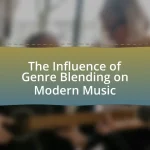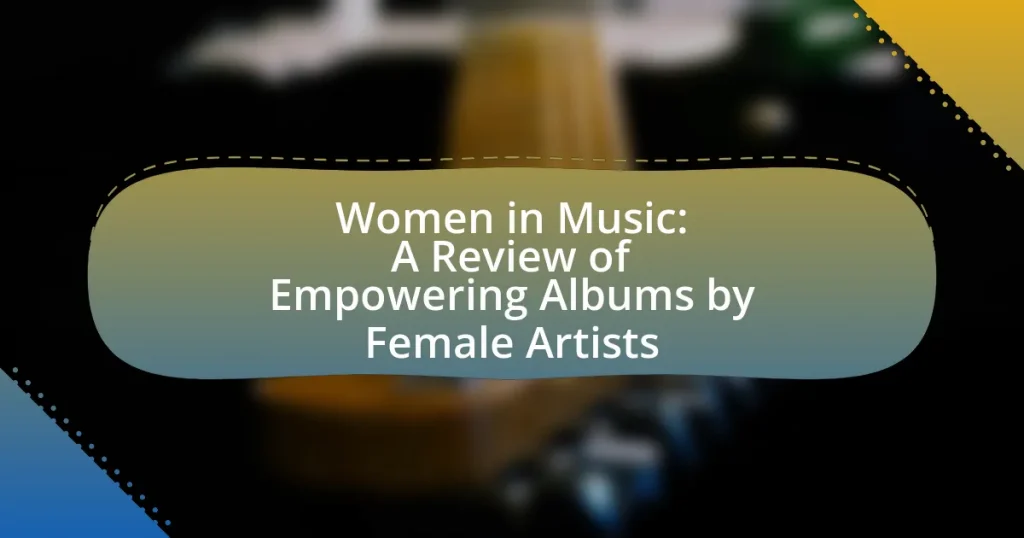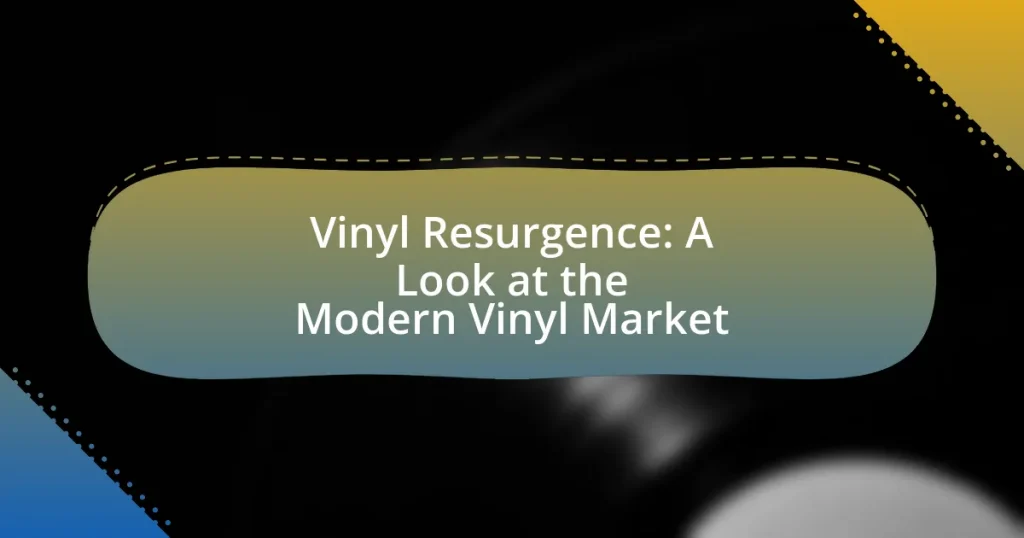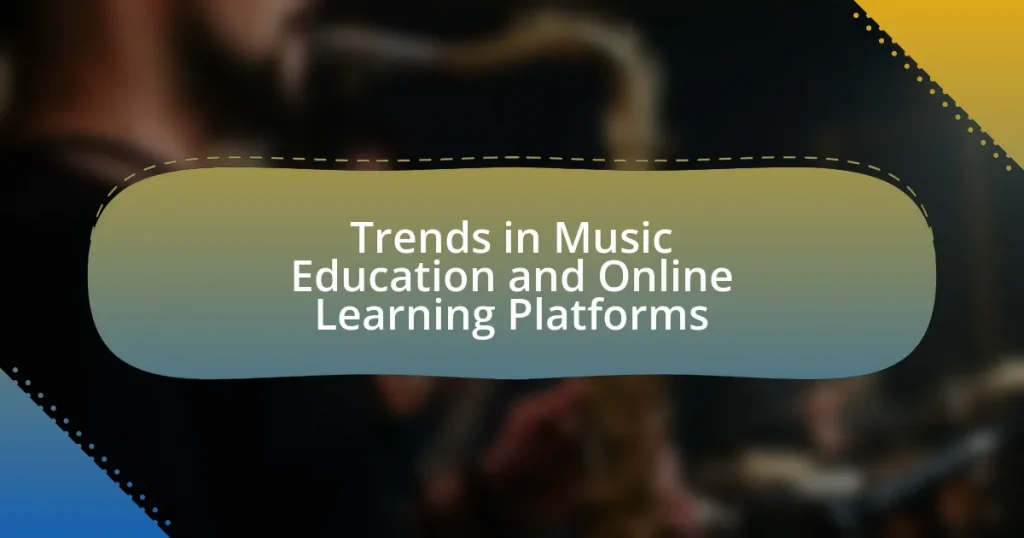The article “Women in Music: A Review of Empowering Albums by Female Artists” examines the significance of empowering albums created by female artists, highlighting themes of self-empowerment, resilience, and social justice. It discusses how these albums reflect women’s experiences and the common themes they explore, such as body positivity and personal growth. The article also addresses the importance of representation in the music industry, the barriers female artists face, and the impact of their work on listeners and social movements. Notable albums and artists, including Beyoncé, Taylor Swift, and Lizzo, are highlighted for their contributions to empowering narratives in music. Additionally, the article outlines best practices for promoting female artists and initiatives aimed at increasing gender equality in the music sector.
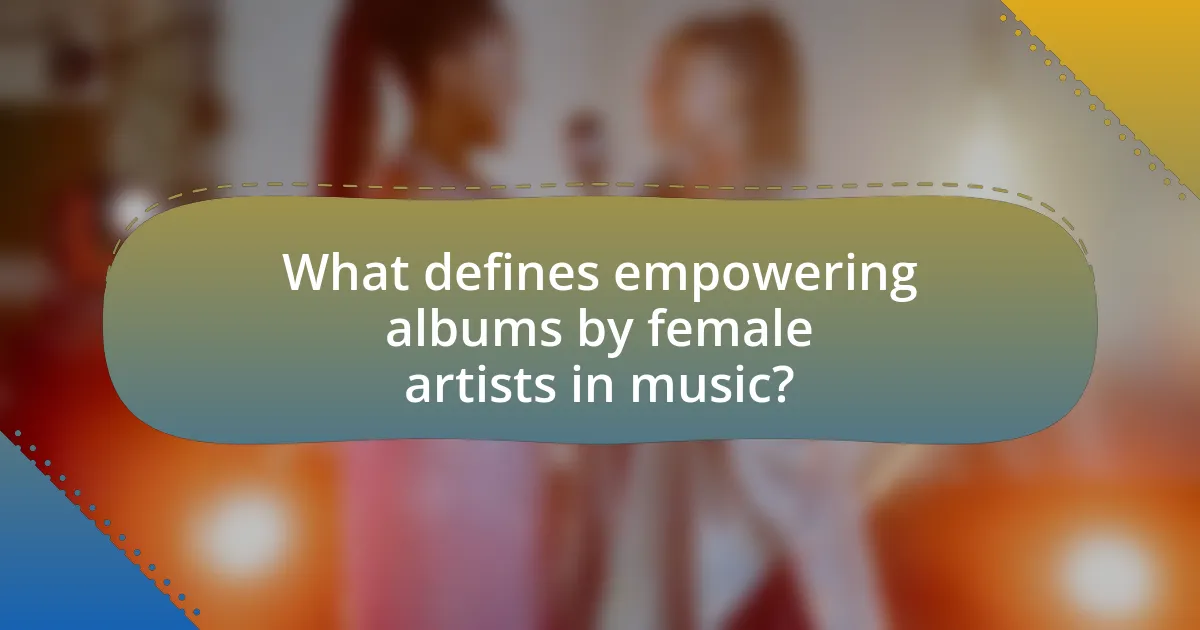
What defines empowering albums by female artists in music?
Empowering albums by female artists in music are defined by their themes of self-empowerment, resilience, and social justice. These albums often feature lyrics that promote confidence, challenge societal norms, and address issues such as gender inequality and personal struggles. For instance, Beyoncé’s “Lemonade” explores themes of infidelity and empowerment, resonating with listeners through its narrative of overcoming adversity. Similarly, Lizzo’s “Cuz I Love You” emphasizes self-love and body positivity, showcasing the impact of music in fostering a sense of empowerment among women. The success of these albums is evidenced by their critical acclaim and commercial performance, with many receiving awards and chart-topping positions, further solidifying their role in empowering female voices in the music industry.
How do these albums reflect the experiences of women?
These albums reflect the experiences of women by addressing themes such as empowerment, identity, and resilience. For instance, artists like Beyoncé in “Lemonade” explore personal and collective struggles, including infidelity and racial identity, which resonate deeply with women’s experiences. Similarly, Taylor Swift’s “Folklore” delves into narratives of heartbreak and self-discovery, showcasing the emotional complexities women face. The lyrical content often highlights societal expectations and challenges, providing a voice to women’s stories and fostering a sense of community and understanding among listeners.
What themes are commonly explored in these albums?
Common themes explored in empowering albums by female artists include self-empowerment, resilience, and social justice. These albums often feature lyrics that promote confidence and independence, reflecting personal growth and overcoming adversity. For instance, artists like Beyoncé and Lizzo address issues of body positivity and self-acceptance, while others, such as Taylor Swift, tackle themes of personal narrative and societal expectations. The prevalence of these themes highlights the role of female artists in advocating for change and inspiring listeners through their music.
How do the lyrics empower female listeners?
The lyrics empower female listeners by promoting themes of self-acceptance, resilience, and independence. For instance, songs that emphasize personal strength and challenge societal norms encourage women to embrace their identities and assert their rights. Research indicates that music with empowering lyrics can enhance self-esteem and foster a sense of community among women, as seen in albums like Beyoncé’s “Lemonade,” which addresses issues of empowerment and personal growth. This connection between lyrical content and emotional impact demonstrates how such music serves as a catalyst for female empowerment.
Why is representation important in the music industry?
Representation is important in the music industry because it ensures diverse voices and perspectives are heard, which enriches the cultural landscape. When women and other underrepresented groups are included, it challenges stereotypes and promotes equality, leading to a more inclusive environment. Research shows that female artists contribute significantly to the music industry, with a 2021 report from the Annenberg Inclusion Initiative revealing that only 22.5% of artists in popular music were women, highlighting the need for greater representation. This lack of representation can limit the narratives and experiences shared in music, ultimately affecting audience engagement and industry growth.
How does female representation impact the music landscape?
Female representation significantly enhances the music landscape by promoting diversity and challenging traditional gender norms. This impact is evident in the increased visibility of female artists across various genres, leading to a broader range of narratives and experiences being shared in music. For instance, the rise of female-led movements, such as the #MeToo movement, has influenced lyrical content and themes, encouraging discussions around empowerment and equality. Additionally, studies show that female artists are more likely to address social issues in their music, which resonates with audiences and fosters a more inclusive culture within the industry. According to a report by the Annenberg Inclusion Initiative, women comprised only 21.6% of artists in popular music from 2012 to 2019, highlighting the ongoing need for increased representation to reshape industry standards and practices.
What barriers do female artists face in gaining recognition?
Female artists face significant barriers in gaining recognition, primarily due to systemic gender biases and unequal opportunities in the music industry. Research indicates that women are often underrepresented in key decision-making roles, such as producers and executives, which limits their visibility and access to resources. For instance, a study by the Annenberg Inclusion Initiative found that only 22.4% of artists on the Billboard Hot 100 were women from 2012 to 2019, highlighting the disparity in representation. Additionally, female artists frequently encounter stereotypes that question their musical abilities and authenticity, further hindering their acceptance and success in a male-dominated industry.
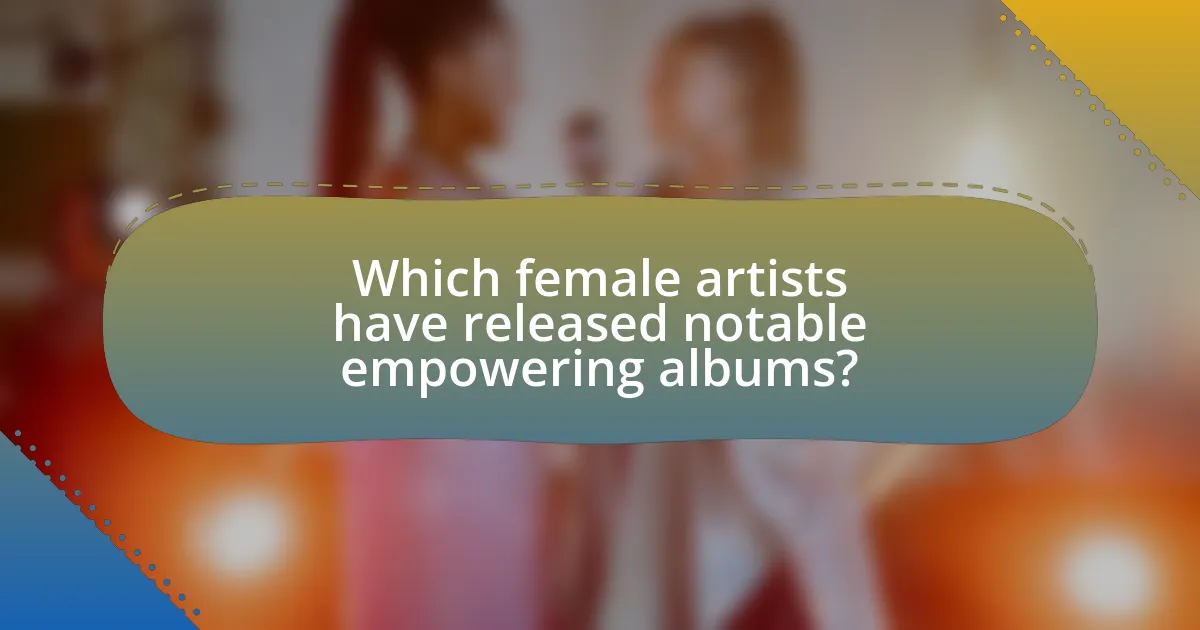
Which female artists have released notable empowering albums?
Beyoncé, Taylor Swift, and Lizzo have released notable empowering albums. Beyoncé’s “Lemonade” (2016) addresses themes of female empowerment, resilience, and social justice, receiving critical acclaim and multiple awards. Taylor Swift’s “Fearless” (2008) and “1989” (2014) promote self-acceptance and independence, resonating with a wide audience and earning significant commercial success. Lizzo’s “Cuz I Love You” (2019) celebrates body positivity and self-love, leading to widespread recognition and accolades. Each of these albums has made a significant impact on the music industry and culture, reinforcing messages of empowerment for women.
What are some landmark albums by female artists?
Some landmark albums by female artists include “Tapestry” by Carole King, “The Miseducation of Lauryn Hill” by Lauryn Hill, and “Jagged Little Pill” by Alanis Morissette. “Tapestry,” released in 1971, is one of the best-selling albums of all time, showcasing King’s songwriting prowess and emotional depth. “The Miseducation of Lauryn Hill,” released in 1998, received critical acclaim and won five Grammy Awards, highlighting Hill’s blend of hip-hop and soul. “Jagged Little Pill,” released in 1995, is noted for its raw lyrics and powerful themes, solidifying Morissette’s impact on the rock genre. These albums have significantly influenced music and culture, marking pivotal moments in the careers of these artists.
How did these albums influence the music industry?
These albums significantly influenced the music industry by challenging gender norms and promoting female empowerment. For instance, albums like “Jagged Little Pill” by Alanis Morissette and “Lemonade” by Beyoncé not only showcased strong lyrical content addressing personal and societal issues but also set new standards for female artists in terms of creative control and commercial success. The success of these albums demonstrated that female-led projects could achieve critical acclaim and substantial sales, leading to increased opportunities for women in various roles within the industry, including production and songwriting. Furthermore, the cultural impact of these albums sparked conversations about feminism and representation in music, encouraging a wave of new female artists to enter the industry and assert their voices.
What awards or recognitions have these albums received?
The albums reviewed in “Women in Music: A Review of Empowering Albums by Female Artists” have received numerous awards and recognitions. For instance, Taylor Swift’s “Folklore” won the Grammy Award for Album of the Year in 2021, while Billie Eilish’s “When We All Fall Asleep, Where Do We Go?” also secured the Grammy for Album of the Year in 2020. Additionally, Lizzo’s “Cuz I Love You” was nominated for several Grammy Awards, including Best Urban Contemporary Album. These accolades highlight the significant impact and recognition of female artists in the music industry.
How do different genres showcase female empowerment?
Different genres showcase female empowerment through their lyrical content, themes, and representation of strong female figures. For instance, pop music often emphasizes self-love and independence, as seen in songs like “Roar” by Katy Perry, which promotes resilience and personal strength. In hip-hop, artists like Nicki Minaj and Cardi B challenge societal norms and assert their dominance in a male-dominated industry, using their platforms to advocate for women’s rights and sexual autonomy. Rock music has historically featured powerful female icons like Joan Jett and Alanis Morissette, who express defiance against traditional gender roles and societal expectations. Additionally, country music has seen artists like Kacey Musgraves and Miranda Lambert address issues of empowerment and self-identity, often reflecting personal narratives that resonate with female listeners. These examples illustrate how various musical genres not only highlight female empowerment but also inspire listeners to embrace their strength and individuality.
What role does genre play in the expression of empowerment?
Genre plays a crucial role in the expression of empowerment by shaping the themes, narratives, and emotional resonance of music created by female artists. Different genres, such as pop, hip-hop, and rock, provide distinct platforms for women to articulate their experiences, assert their identities, and challenge societal norms. For instance, hip-hop often emphasizes resilience and self-assertion, as seen in the works of artists like Nicki Minaj and Cardi B, who use their lyrics to confront issues of gender inequality and personal empowerment. Similarly, pop music, exemplified by artists like Beyoncé, often incorporates anthems of self-love and independence, reinforcing messages of empowerment through catchy melodies and widespread appeal. The genre influences not only the style and delivery of the message but also the audience’s reception and interpretation, making it a vital component in the empowerment narrative within women’s music.
Which genres have the most impactful female artists?
The genres with the most impactful female artists are pop, rock, and hip-hop. Pop has produced influential figures like Madonna and Beyoncé, who have shaped the genre and culture significantly. Rock features iconic artists such as Janis Joplin and Joan Jett, who broke barriers and inspired generations. In hip-hop, artists like Missy Elliott and Nicki Minaj have redefined the genre, showcasing female empowerment and creativity. These genres demonstrate a strong presence of female artists who have made lasting contributions to music and society.
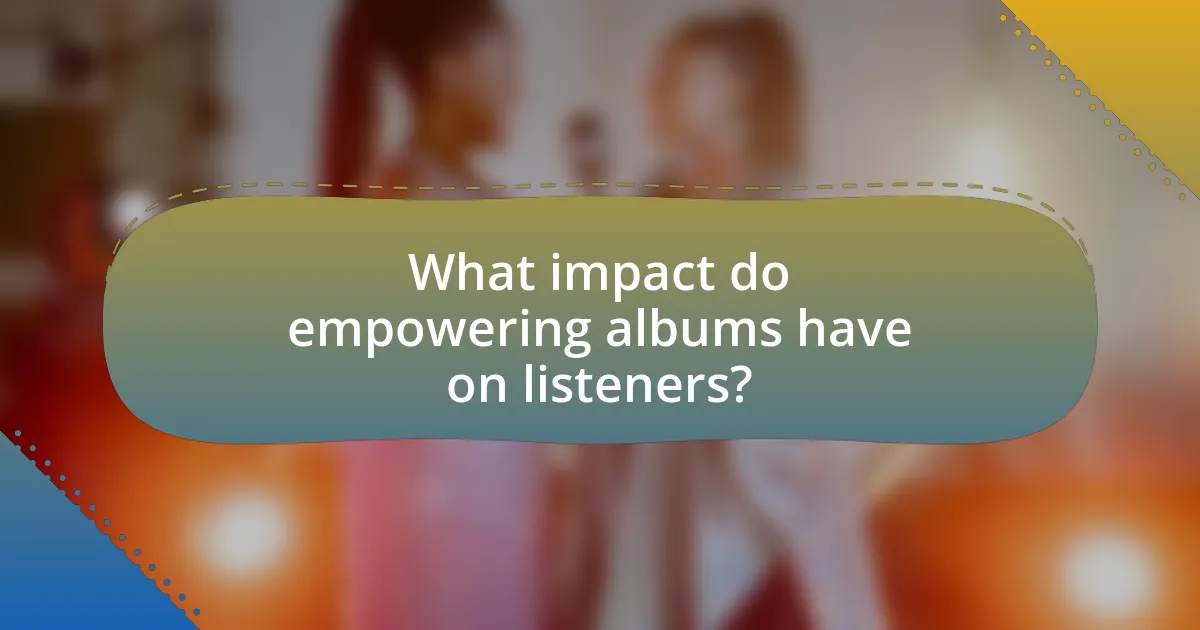
What impact do empowering albums have on listeners?
Empowering albums significantly enhance listeners’ self-esteem and motivation. Research indicates that music with empowering themes can lead to increased feelings of confidence and resilience among listeners. For instance, a study published in the Journal of Personality and Social Psychology found that listening to songs with positive and empowering lyrics can improve mood and promote a sense of agency. Additionally, albums by female artists often address themes of empowerment, which resonate particularly with women, fostering a sense of community and shared experience. This connection can lead to greater emotional support and validation, ultimately influencing listeners’ personal growth and self-identity.
How do these albums inspire social change?
These albums inspire social change by addressing critical issues such as gender equality, empowerment, and social justice through their lyrics and themes. For instance, artists like Beyoncé in “Lemonade” confront systemic racism and infidelity, while empowering women to reclaim their narratives. Similarly, Taylor Swift’s “Fearless” promotes self-acceptance and resilience, encouraging listeners to challenge societal norms. The impact of these albums is evidenced by increased discussions around feminism and activism, as seen in the rise of movements like #MeToo, which gained momentum partly due to the visibility and influence of female artists.
What movements have been influenced by these albums?
Empowering albums by female artists have significantly influenced movements such as feminism, gender equality, and body positivity. For instance, albums like “The Miseducation of Lauryn Hill” have been pivotal in the feminist movement by addressing issues of identity and empowerment, while artists like Beyoncé have championed gender equality through her work, particularly in songs like “Flawless.” Additionally, the body positivity movement has been shaped by albums like Lizzo’s “Cuz I Love You,” which promotes self-acceptance and confidence. These albums serve as cultural touchstones that resonate with and propel social movements forward, demonstrating the power of music in advocating for change.
How do listeners relate personally to the messages in these albums?
Listeners relate personally to the messages in these albums by finding reflections of their own experiences, struggles, and aspirations within the lyrics and themes presented. For instance, albums that address issues such as empowerment, resilience, and self-identity resonate deeply with individuals facing similar challenges in their lives. Research indicates that music can evoke strong emotional responses, and when listeners identify with the narratives of female artists, they often feel validated and understood. This connection is further supported by studies showing that women, in particular, may find solace and inspiration in songs that articulate their own journeys, fostering a sense of community and shared experience.
What are the best practices for promoting female artists?
The best practices for promoting female artists include leveraging social media platforms, collaborating with established artists, and creating targeted marketing campaigns. Social media platforms like Instagram and TikTok allow female artists to reach wider audiences and engage directly with fans, which is crucial for building a loyal following. Collaborations with established artists can enhance visibility and credibility, as seen in successful partnerships like those between Billie Eilish and Khalid. Targeted marketing campaigns that focus on female empowerment resonate well with audiences, as evidenced by initiatives like the “Women in Music” campaign by the Recording Academy, which highlights female contributions to the industry. These strategies collectively contribute to a more equitable representation of female artists in the music landscape.
How can fans support female artists effectively?
Fans can support female artists effectively by actively purchasing their music, attending their concerts, and promoting their work on social media. Engaging with their content through streaming platforms and buying merchandise directly contributes to their financial success and visibility. According to a 2021 report by the Music Industry Research Association, female artists receive significantly less funding and promotion compared to their male counterparts, highlighting the importance of fan support in leveling the playing field. By sharing their music and advocating for their performances, fans can help increase awareness and appreciation for female artists, ultimately fostering a more equitable music industry.
What initiatives exist to promote women in music?
Initiatives that promote women in music include organizations like Women in Music, which advocates for gender equality and provides networking opportunities, and She Is The Music, which focuses on increasing the number of women in music creation and production roles. Additionally, the Recording Academy’s initiatives, such as the Grammy Museum’s programs, aim to educate and empower women in the industry. These organizations often conduct research, provide scholarships, and host events to support female artists and industry professionals, thereby fostering a more inclusive environment in the music sector.








